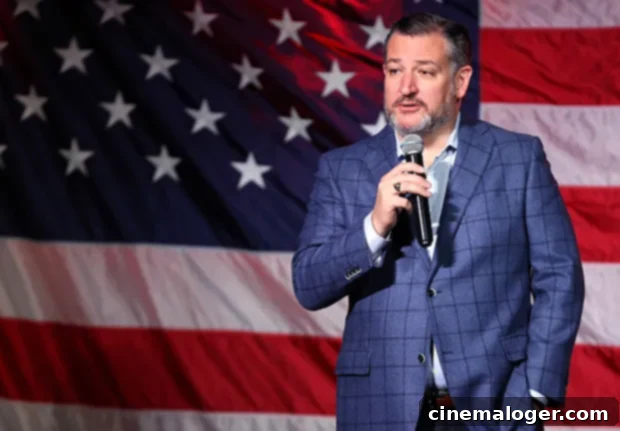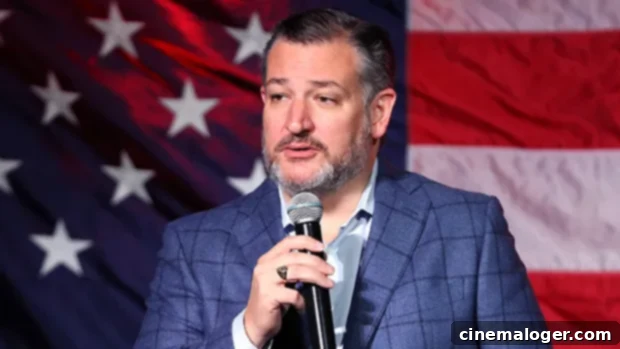Senator Ted Cruz Faces Dual Public Outbursts: Climate Protesters Disrupt ‘The View’ and Yankees Fans Unleash Fury
Texas Senator Ted Cruz recently found himself at the center of two distinct and highly publicized public confrontations, underscoring the intense polarization of contemporary American politics. During an appearance on the popular talk show The View, the Republican politician was unexpectedly heckled by climate change activists. This incident occurred just a day after he was met with a chorus of boos and expletives from disgruntled New York Yankees fans at a baseball playoff game. These back-to-back encounters highlight the increasingly common challenges faced by public figures navigating a landscape where political discourse often spills from traditional forums into everyday public spaces.
The Unexpected Disruption on The View Stage
The Monday, October 24th broadcast of The View took an unforeseen turn when Senator Ted Cruz, a prominent figure in conservative politics, was mid-sentence. Invited to discuss his new book and various political topics, Cruz was answering a question about the pressing issue of inflation when loud shouts erupted from the studio audience. Eyewitness accounts and video footage shared online indicate that the protesters were primarily focused on climate change, with calls like “Vote for climate now” clearly audible amidst the commotion. The interruption quickly escalated, culminating in what sounded like profane language directed at the senator, prompting the show’s producers to abruptly cut to a commercial break.
Someone is using profanity on @TheView @WhoopiGoldberg @sunny @JoyVBehar @tedcruz pic.twitter.com/tDeORazce5
— Manny Alicandro (@Manny_Alicandro) October 24, 2022
The Hosts’ Swift and Decisive Response
As the climate activists continued their vocal protest, the co-hosts of The View intervened to regain control of the live broadcast. Alyssa Farah Griffin was among the first to acknowledge the protesters, calmly stating, “We do cover climate here, guys,” in an attempt to both address their concerns and remind them of the show’s format. Shortly after, moderator Whoopi Goldberg took a firmer stance, addressing the disruptive audience members directly. “Ladies, excuse us. Let us do our job. Let us do our job. We hear what you have to say, but you got to go. You got to go. You got to let us do our job,” Goldberg asserted, her words signaling a clear boundary for appropriate conduct in the studio.
Senator Cruz initially expressed some confusion, remarking that he couldn’t quite discern what the protesters were shouting. Co-host Sunny Hostin then clarified the situation for him, explaining that the disruption was indeed related to climate change. Cruz, perhaps attempting to defuse the tension with humor, made a lighthearted reference to recent climate protests in Europe where activists had thrown food at priceless works of art. “I’m really glad you don’t have a Van Gogh [painting] on the wall,” he quipped, drawing a mixed reaction from the panel and remaining audience. This moment showcased the delicate balance between maintaining decorum and allowing for political expression, even when it manifests as disruption.
pic.twitter.com/hF2y4K8Bht
— v (@ViralMaterialz) October 24, 2022
A Second Outburst and an On-Air Apology
Following the initial wave of heckling and the subsequent commercial break, the situation in the studio appeared to calm. Sunny Hostin continued the interview, posing another question to Senator Cruz. However, toward the conclusion of his response, a second and more pronounced outburst occurred. A distinct “Hey!” was heard, followed by what seemed to be a shouted expletive before the broadcast abruptly cut to another commercial. While Senator Cruz reacted with a chuckle, the faces of the co-hosts conveyed visible anger and frustration, underscoring the gravity of the disruption on a live television program.
Upon returning from the commercial break, co-host Ana Navarro extended a sincere apology to Senator Cruz for the interruptions. “I’ve been very vocal and very critical of you, but I’m sorry that this has happened in our house,” she stated, emphasizing the expectation of respectful dialogue within their show’s environment. Cruz graciously accepted her apology, and the interview resumed without further audience interference. Despite the initial chaos, the discussion proceeded, covering contentious topics such as former President Donald Trump’s refusal to accept the 2020 election results and the January 6th insurrection. The exchange remained heated at times, with the hosts and the senator engaging in vigorous debate, yet the professional framework of the show was ultimately upheld.

From Talk Show Set to Ballpark Stands: The Yankees Game Confrontation
The incident on The View followed closely on the heels of another public confrontation involving Senator Cruz, this one occurring at Yankee Stadium on Sunday evening. The senator was attending a playoff game between the New York Yankees and the Houston Astros when he became the target of intense heckling from hometown fans. A video clip, widely circulated on TikTok by a Yankees fan, captured the raw emotions of the crowd, with fans swearing and shouting obscenities directly at Cruz from the stands. This spontaneous outburst in a public arena showcased a different facet of political protest, characterized by the visceral reactions of sports enthusiasts.
Interestingly, Ana Navarro had made an early, lighthearted reference to the Yankee Stadium incident at the beginning of Cruz’s interview on The View. When audience members applauded Cruz, she joked, “They gave you a better reception than the Yankees’ fans,” implying that the studio audience was more welcoming. However, after the disruptions within their own studio, Navarro swiftly retracted her earlier comment. “I take back what I said about the Yankees’ fans,” she conceded, highlighting the unexpected and sometimes unpredictable nature of public sentiment, whether in a television studio or a sports stadium.
The Broader Implications of Public Confrontation in a Polarized Era
These two incidents, occurring in vastly different settings but within a short timeframe, shed light on a growing trend of direct public confrontation targeting political figures. The heckling of Senator Cruz, first by climate activists on a national television show and then by sports fans at a baseball game, reflects the increasingly polarized political climate in the United States. In an era dominated by social media and 24/7 news cycles, the lines between formal political discourse and informal public expression are increasingly blurred. Citizens, fueled by strong convictions and often a sense of urgency, are opting for direct and often disruptive forms of protest to make their voices heard.
The choice of venue for these protests is also significant. While a talk show like The View offers a platform for debate and discussion, it is still a controlled environment. The intrusion of hecklers forces hosts to mediate not just between guests but also with the audience, adding another layer of complexity to live broadcasting. Conversely, a public space like a sports stadium is inherently less controlled, making it a fertile ground for spontaneous expressions of approval or disapproval, often amplified by the anonymity of a crowd. Such incidents raise questions about the boundaries of free speech, the right to protest, and the expectations of decorum when public figures engage with the populace.
Moreover, these events serve as a stark reminder of the personal toll that hyper-partisanship can take on public figures. Regardless of one’s political stance, enduring sustained criticism and outright hostility in public forums can be challenging. For the protesters, these actions are often seen as necessary disruptions to draw attention to critical issues they feel are being ignored or mishandled. For the politicians, it represents a constant navigation of public sentiment, where every appearance, no matter how mundane, can become a potential flashpoint. The incidents involving Senator Ted Cruz are not isolated; rather, they are symptomatic of a broader societal trend where direct confrontation has become an increasingly common, if controversial, tool in the arsenal of political engagement.
As the political landscape continues to evolve, the dynamics between public figures and the citizenry will undoubtedly remain a focal point. These recent events involving Senator Cruz underscore the ongoing tension between freedom of expression and the maintenance of order, particularly in high-profile public settings. The ability of both media outlets and public institutions to manage these confrontations effectively will be crucial in shaping the future of civic discourse.
